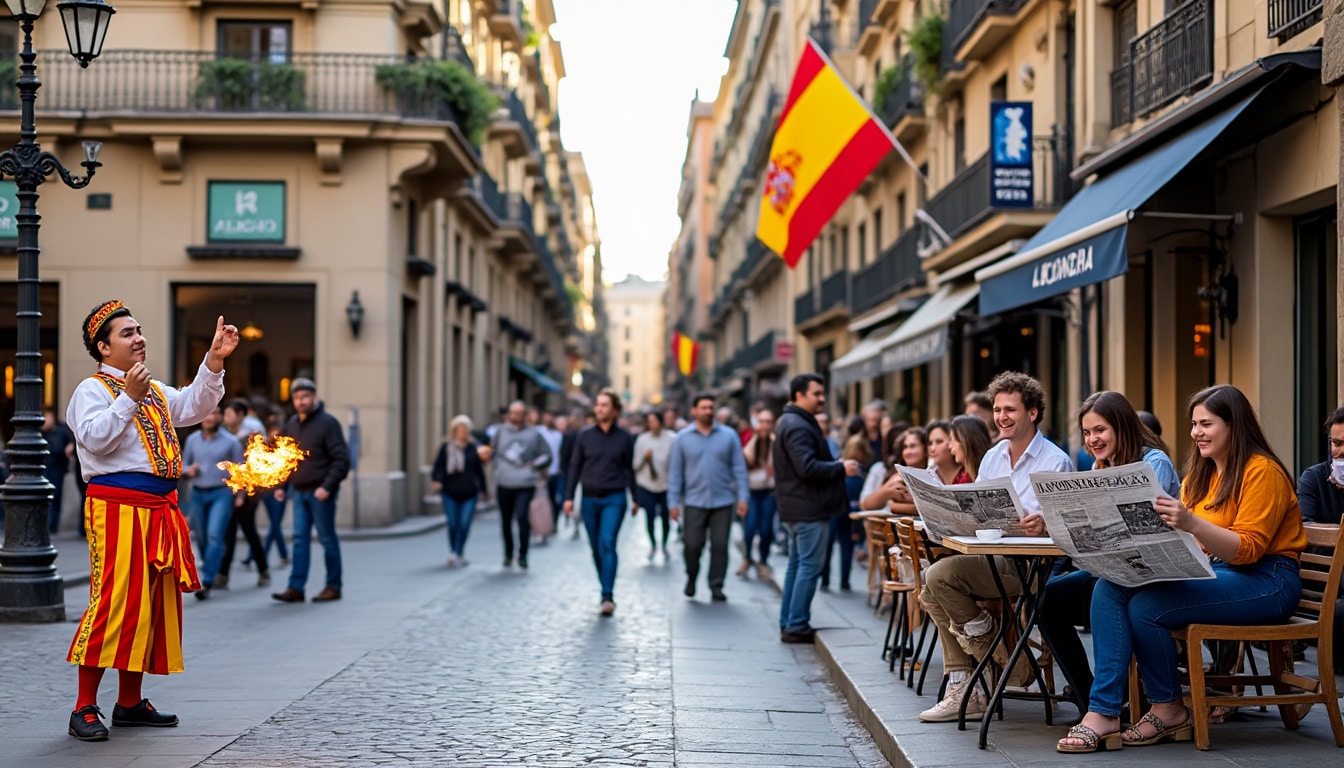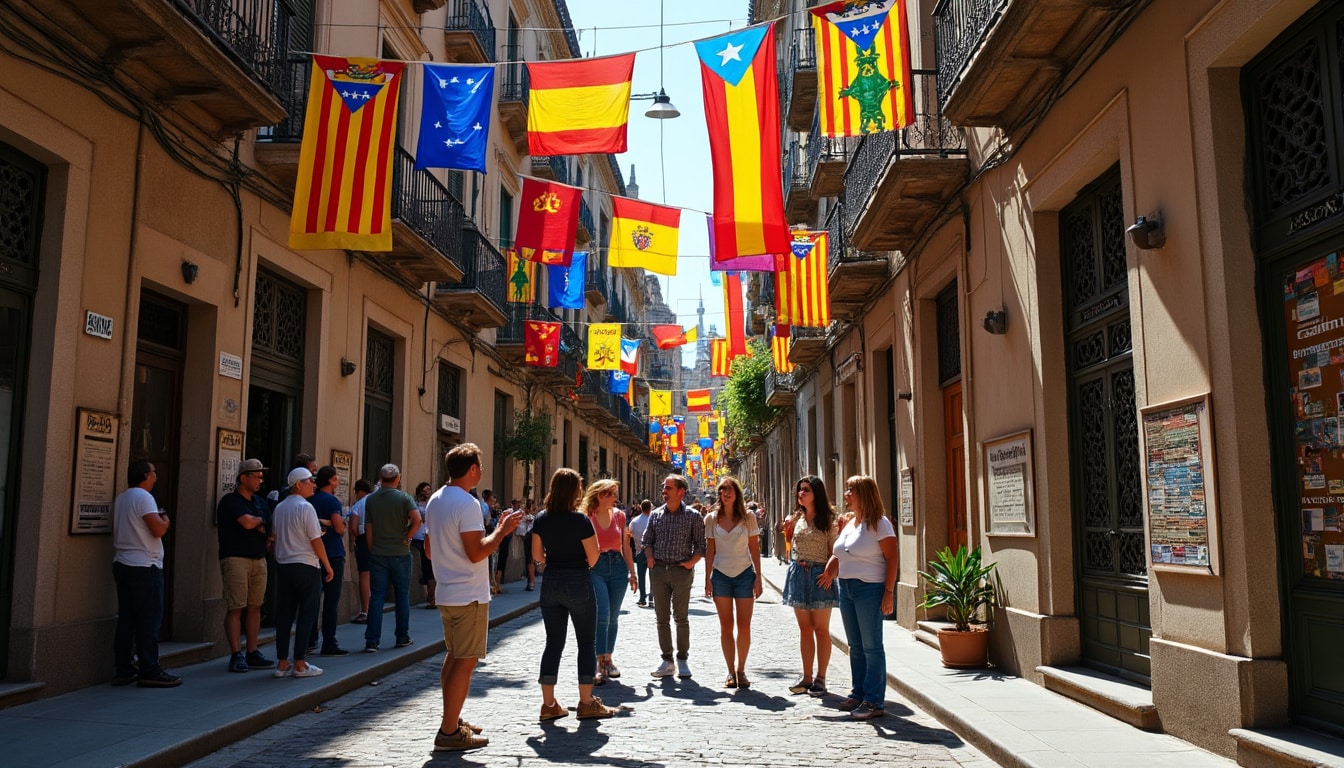Barcelona, the vibrant capital of Catalonia, effortlessly blends its rich historical background with modernity, making it a top destination for travelers worldwide. One distinguishing feature of the city’s charm is its unique linguistic landscape, as both Catalan and Spanish coexist harmoniously. While visitors might initially be unsure about the language dynamics in Barcelona, understanding them is crucial to fully appreciating the city’s culture and identity. In this article, we will delve into the fascinating world of Barcelona’s language and spelling, uncover the roles of Catalan and Spanish, and provide practical tips for navigating this bilingual metropolis.
Catalan and Spanish: The Linguistic Heartbeat of Barcelona
Barcelona’s bilingualism is not merely a convenience but a deeply ingrained aspect of its cultural identity. Catalan and Spanish hold official status, allowing residents to seamlessly switch between the two. Spanish, or Castellano, is spoken by virtually everyone and serves as the primary language for most day-to-day interactions and business transactions. However, Catalan is more than just a language; it is a symbol of the region’s historical and cultural identity.
- 🇪🇸 Spanish (Castellano): Spoken by nearly everyone, used in business and social settings.
- 🏴 Catalan: Deeply rooted in regional identity; prominent in education, government, and media.
The coexistence of these languages has historical roots dating back centuries. During Franco’s regime, Catalan was suppressed, but it experienced a resurgence following Spain’s transition to democracy. Nowadays, Catalan is taught in schools and used extensively in local media and public signage, showcasing its resilience and importance to Catalonia’s identity. Visitors will notice that street signs, official documents, and cultural events highlight the prominence of Catalan in Barcelona. For a deeper exploration of the region’s historical dynamics, check out the Barcelona history facts.

The Unique Role of Catalan in Barcelona’s Culture
The role of Catalan extends beyond language. It serves as a vehicle for preserving local customs, traditions, and expressions integral to Catalonia’s cultural fabric. For instance, Catalan is the preferred language in many religious ceremonies, cultural festivals, and art performances. Residents often use Catalan at home, fostering a sense of community and identity. Speaking Catalan can sometimes become a political statement, as it reflects regional pride and autonomy aspirations. For example, when FC Barcelona (fondly known as Barca) plays football, many fans opt for Catalan chants, further emphasizing their local allegiance.
Navigating Barcelona as a Visitor: Language Tips and Tricks
Barcelona’s multilingual environment might initially seem daunting, but with a few language tips, visitors can navigate the city confidently. First and foremost, understanding common greetings and phrases in both Catalan and Spanish can enhance your interactions with locals.
- 👋 Common Greetings: “Hola” (Spanish) and “Bon Dia” (Catalan) for “Hello/Good Morning.”
- 🙏 Politeness: “Gracias” (Spanish) and “Gràcies” (Catalan) for “Thank you.”
Though Spanish is widely spoken, making an effort to use basic Catalan expressions might resonate positively with the local residents. Engaging with locals using phrases like “El compte, si us plau” (the bill, please) in Catalan can lead to delightful conversations. Additionally, English is also understood in popular tourist areas, making communication easy for many international visitors. For practical tips on settling into Barcelona, including meal times and etiquette, visit Meal Times in Barcelona.
| Phrase | English Meaning | In Catalan | In Spanish |
|---|---|---|---|
| Hello | 👋 | Bon Dia | Hola |
| Please | 🙏 | Si us plau | Por favor |
| Thank you | 🙏 | Gràcies | Gracias |
The Distinctions Between Catalan and Spanish Explained
Although sharing a common Latin root, Catalan and Spanish are distinct languages with unique grammatical structures, vocabulary, and pronunciation. These differences become apparent when comparing basic phrases and daily conversations. For example, in Catalan, verbs follow different conjugation rules, and the language features sounds not present in Spanish. Grammatically, Catalan has a more extensive use of definite articles than Spanish, and vocabulary often has unique words that find no equivalent in its counterpart.
Structurally, the pronunciation between the two languages also offers distinctive nuances. In Catalan, consonants at the end of words are pronounced more softly compared to Spanish, significantly affecting how words sound. Moreover, the intonation and rhythm in speech can differ, giving each language its characteristic melody. Despite these differences, individuals who speak either language can often comprehend basic elements of the other, thanks to their shared linguistic origin.
Learning Catalan vs. Spanish: Which to Choose?
Visitors and potential residents might wonder: should they focus on learning Catalan or Spanish? The answer often depends on individual preferences and circumstances. Catalan is mostly limited to Catalonia, the Balearic Islands, and some regions in southern France, while Spanish has a global prominence, being spoken across several continents. Therefore, for travelers aiming to engage broadly beyond Barcelona, Spanish might be the more practical choice.
However, for visitors looking to integrate more deeply into Barcelona’s local culture, learning Catalan can demonstrate respect and understanding of the regional heritage. Moreover, knowing a few phrases in Catalan can open doors to richer interactions and experiences within the city’s cultural and social milieu.
| Language Aspect | Catalan | Spanish |
|---|---|---|
| Pronunciation | Softer consonants | More distinct consonants |
| Usage Scope | Regional | Global |
| Vocabulary | Unique regional phrases | Common across Spanish-speaking countries |
The Influence of Language on Barcelona’s Culture and Life
The interplay between Catalan and Spanish languages fundamentally shapes the cultural experience throughout Barcelona, influencing everything from architecture to local culinary delights. Language nuances can be observed in Barcelona’s art, music, and even sporting environments, such as the chants and slogans heard at FC Barcelona matches.
Furthermore, language is embedded in architecture through inscriptions, signage, and more. The grandeur of Barcelona’s architecture, whether traditional or modernist, often features elements that pay homage to both Catalan and Spanish histories. This linguistic blend enhances the city’s multifaceted identity, enriching the experience for visitors and residents alike.
- 🎨 Art and Music: Language differences influence thematic content and expression.
- 🍽️ Culinary Delights: Discover traditional dishes with Catalan and Spanish influences. For a deeper dive into cuisine, explore Food in Barcelona.
- 🏟️ Sports and Events: Experience the language dynamic at events, particularly with local sports like FC Barcelona’s matches.
Understanding the linguistic diversity of Barcelona provides an enriched appreciation for its cultural heritage. Embracing this blend of Catalan and Spanish opens up avenues to explore the city’s authentic character and engage with its welcoming community.
Frequently Asked Questions (FAQs)
1. Do most people in Barcelona speak Catalan or Spanish?
Most residents are bilingual, with Spanish (98%) being widely spoken, while around 50-60% of the population speaks Catalan.
2. Is it possible to get by using only English in Barcelona?
Yes, particularly in tourist areas, English is commonly spoken. However, knowing some basic Spanish or Catalan phrases is advisable for a smoother experience.
3. How did the use of Catalan evolve in Barcelona?
Catalan was repressed during the Franco regime but saw a revival post-democracy, regaining its significance in education, media, and government.
4. Can a Spanish speaker easily understand Catalan?
Not entirely; while there are similarities, distinct vocabulary and grammar in Catalan may pose comprehension challenges.
5. Which language should a visitor choose to learn?
Spanish is more universally applicable, but learning Catalan can be rewarding for understanding local culture and identity.

